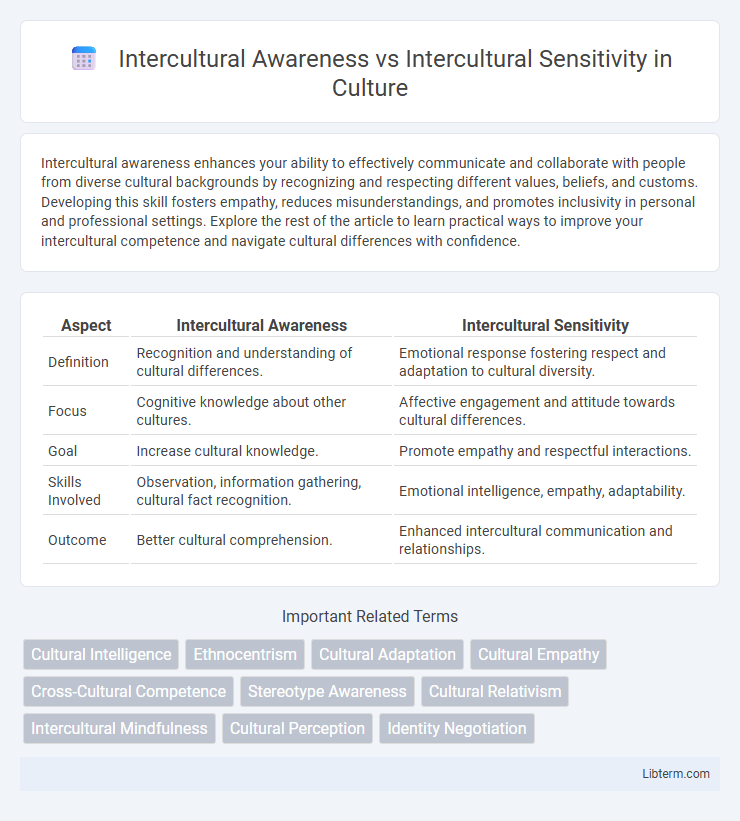Intercultural awareness enhances your ability to effectively communicate and collaborate with people from diverse cultural backgrounds by recognizing and respecting different values, beliefs, and customs. Developing this skill fosters empathy, reduces misunderstandings, and promotes inclusivity in personal and professional settings. Explore the rest of the article to learn practical ways to improve your intercultural competence and navigate cultural differences with confidence.
Table of Comparison
| Aspect | Intercultural Awareness | Intercultural Sensitivity |
|---|---|---|
| Definition | Recognition and understanding of cultural differences. | Emotional response fostering respect and adaptation to cultural diversity. |
| Focus | Cognitive knowledge about other cultures. | Affective engagement and attitude towards cultural differences. |
| Goal | Increase cultural knowledge. | Promote empathy and respectful interactions. |
| Skills Involved | Observation, information gathering, cultural fact recognition. | Emotional intelligence, empathy, adaptability. |
| Outcome | Better cultural comprehension. | Enhanced intercultural communication and relationships. |
Introduction to Intercultural Awareness and Intercultural Sensitivity
Intercultural awareness involves recognizing and understanding cultural differences, including norms, values, and communication styles, to navigate diverse social environments effectively. Intercultural sensitivity extends this awareness by fostering empathy and respect for cultural diversity, encouraging positive interactions and reducing ethnocentric attitudes. Both concepts are fundamental in global communication, enhancing collaboration and minimizing cultural conflicts.
Defining Intercultural Awareness
Intercultural awareness involves recognizing and understanding cultural differences, including values, beliefs, and customs, to navigate diverse social contexts effectively. It emphasizes cognitive knowledge about other cultures, fostering open-mindedness and reducing ethnocentric attitudes. This awareness lays the foundation for developing intercultural sensitivity, which goes beyond recognition to include emotional engagement and empathetic responses to cultural diversity.
Understanding Intercultural Sensitivity
Intercultural sensitivity involves recognizing and respecting cultural differences while being open to diverse perspectives and practices. It requires developing emotional intelligence to respond appropriately and empathetically in cross-cultural interactions. Understanding intercultural sensitivity enhances effective communication and reduces misunderstandings in multicultural environments.
Key Differences Between Awareness and Sensitivity
Intercultural awareness involves recognizing and understanding cultural differences, including values, customs, and communication styles, while intercultural sensitivity goes deeper by fostering an emotional connection and respect for those differences. Awareness is primarily cognitive, centered on knowledge acquisition, whereas sensitivity emphasizes empathy, openness, and adaptive behaviors in diverse cultural interactions. Key differences include awareness being foundational for identifying cultural gaps, and sensitivity promoting effective, respectful engagement and reducing ethnocentric attitudes.
Importance of Intercultural Awareness in Global Communication
Intercultural awareness is crucial in global communication as it enables individuals to recognize and respect cultural differences, reducing misunderstandings and fostering effective collaboration across diverse groups. By understanding cultural norms, values, and communication styles, professionals can adapt their messages appropriately, enhancing clarity and mutual respect. This awareness supports building trust, promoting inclusivity, and improving international business relations and diplomatic interactions.
The Role of Intercultural Sensitivity in Building Relationships
Intercultural sensitivity plays a crucial role in building relationships by enabling individuals to recognize, respect, and adapt to cultural differences, fostering trust and effective communication. Unlike intercultural awareness, which involves knowledge of cultural differences, intercultural sensitivity emphasizes emotional engagement and empathy, promoting deeper connections across cultures. This heightened understanding reduces misunderstandings and conflicts, ultimately enhancing collaboration in multicultural environments.
Developing Intercultural Awareness: Practical Strategies
Developing intercultural awareness involves recognizing cultural differences and understanding their impact on communication and behavior across diverse environments. Practical strategies include engaging in active listening, participating in cultural immersion experiences, and seeking continuous education on cultural norms and values. Emphasizing empathy and open-mindedness enhances the ability to adapt effectively in multicultural interactions, bridging gaps between various cultural perspectives.
Fostering Intercultural Sensitivity: Best Practices
Fostering intercultural sensitivity involves active listening, empathy, and open-mindedness to diverse cultural perspectives, enhancing effective communication across cultures. Best practices include immersive cultural experiences, continuous self-reflection, and targeted training programs that highlight cultural norms, values, and non-verbal cues. Building intercultural sensitivity promotes inclusivity and reduces prejudices, essential for global teamwork and collaboration.
Intercultural Awareness and Sensitivity in the Workplace
Intercultural awareness in the workplace involves recognizing and understanding cultural differences and their impact on communication, collaboration, and decision-making. Developing intercultural sensitivity goes beyond awareness by fostering respect, empathy, and adaptability towards diverse cultural perspectives, which enhances team cohesion and reduces conflicts. Organizations that prioritize both awareness and sensitivity benefit from improved employee engagement, innovation, and global business effectiveness.
Conclusion: Bridging Cultures Through Awareness and Sensitivity
Intercultural awareness enhances understanding of diverse cultural norms and values, while intercultural sensitivity involves responding respectfully and empathetically to those differences. Combining both is essential for effective cross-cultural communication, fostering mutual respect, and reducing misunderstandings in global interactions. Emphasizing awareness and sensitivity bridges cultural gaps, promoting inclusive environments in multicultural settings.
Intercultural Awareness Infographic

 libterm.com
libterm.com